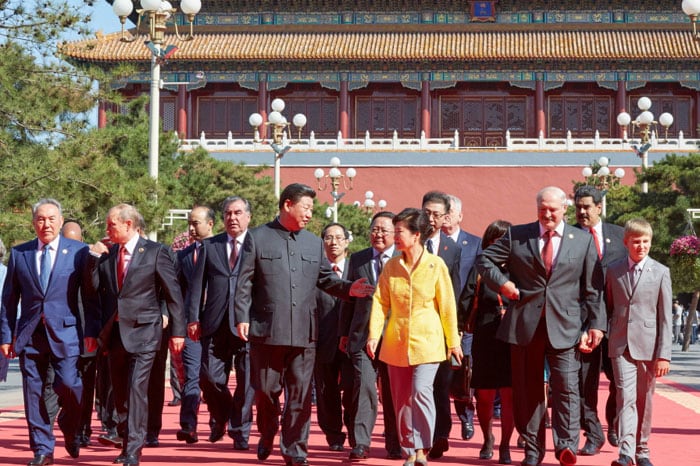
President Park Geun-hye (third from right) walks toward Tiananmen Square with Chinese President Xi Jinping and other world leaders who are in Beijing for China’s 70th anniversary of its victory in the Chinese People’s War of Resistance Against Japanese Aggression, on Sept. 3.
President Park Geun-hye emphasized on Sept. 4 that the Korea-China relationship needs to continuously develop so that the Korean Peninsula and Northeast Asia can move toward a future of peace and stability.
In an interview with the People’s Daily, the official newspaper of the Chinese Communist Party, she said, “In order to transform the various conflicts and confrontations taking place these day in Northeast Asia into peace and cooperation, we need to make a joint effort to move forward toward a new future based on a proper understanding of history. Based on such a foundation, the scars of history will be healed and cured.”
“History will flow and exist forever. Those who do not admit to it are just trying to cover the sky with their bare palms, overestimating their capability,” she added.
“This year marks the 70th anniversary of victory in the Chinese People’s War of Resistance Against Japanese Aggression and the end of World War II. It is meaningful that this year also marks the 70th year of Korea’s independence and that of the division of the Korean Peninsula.”
She also emphasized the importance of a paradigm that enhances mutual cooperation based on common understanding in Northeast Asia.
“In order to build a new order of trust through the practice of cooperation, Korea has been carrying out its Northeast Peace and Cooperation Initiative and is making efforts to restart the trilateral summit meetings between Korea, China and Japan,” said the president, regarding relations between the three countries.
“I hope an important turning point can be made to create a more future-looking order in Northeast Asia through both this anniversary of victory in war and through the Korea-China summit,” she added.
In regard to the Seoul-Beijing relationship, she said, “In order for Korea and China to make their dreams come true together, both sides need to make further developments in the long term in their strategic partnership that has been expanded to wider areas, such as politics, diplomacy and security. Both countries need to cooperate and make more efforts so that the Korean Peninsula and Northeast Asia can move toward a future of long-lasting peace and stability.”
“If Korea and China develop their ties in a future-forward manner, it will be helpful for both to achieve their goals of ‘The Chinese Dream’ (‘中國夢’) and a ‘Second Miracle on the Hangang River,’” she added.

President Park Geun-hye (right) talks with Chinese First Lady Peng Liyuan during a ceremonial reception luncheon in the Great Hall of the People. The event marked the 70th anniversary of China’s victory in the Chinese People’s War of Resistance Against Japanese Aggression and the end of World War II.
Meanwhile, media outlets overseas looked closely at the Korea-China summit between President Park and Chinese President Xi Jinping, as well as her attendance at the celebration of the 70th anniversary of China’s victory in the Chinese People’s War of Resistance Against Japanese Aggression and the end of World War II.
Bloomberg focused on the proposed trilateral summit among Korea, China and Japan as discussed by President Park and President Xi. The news agency said, “A three-way summit may ease tensions related to territorial disputes and invigorate talks on a free-trade deal between the countries.”
Japanese media, such as the Asahi and Yomiuri Shimbun and Kyodo News, all focused on the proposed trilateral summit meeting as well. The Asahi Shimbun reported that Chief Cabinet Secretary Yoshihide Suga said that he, “wants to discuss the concrete time and venue for the meeting through continued communication with Korea and Japan.” In regard to the Korea-Japan summit, the daily said the Japanese official, “showed willingness to accept the proposal if the other party hopes to do so.”
In an interview with Du Ping (杜平), a commentator on current affairs in Hong Kong, China’s Phoenix Television said, “President Park’s China visit will be an important first step in the independent diplomacy of Korea.”
Regarding President Park’s presence close to President Xi and Russian President Vladimir Putin during the military parade, Japan’s Nikkei reported that, “President Xi highlighted the cordial reception and hospitality shown to both countries.”
The Paper (澎湃新闻), a Chinese news outlet, said, “President Park’s presence on China’s war victory anniversary can be seen as part of the Northeast Asian Peace and Cooperation Initiative.” Regarding her position close to President Xi and President Putin, it said, “Her administration’s attendance at the event will be the first step in overcoming the ‘Asian Paradox.’”
By Yoon Sojung
Korea.net Staff Writer
Photos: Cheong Wa Dae
arete@korea.kr























